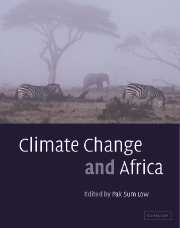Book contents
- Frontmatter
- Contents
- Notes on contributors
- Peer reviewers
- Editor's note
- Foreword
- Foreword
- Foreword
- Foreword
- Preface
- Preface
- Preface
- Preface
- List of abbreviations
- List of SI prefixes
- List of unit abbreviations
- List of chemical formulae
- Part I Science
- 1 Holocene climatic, hydrological and environmental oscillations in the tropics with special reference to Africa
- 2 The relative importance of the different forcings on the environment in Ethiopia during the Holocene
- 3 Global warming and African climate change: a reassessment
- 4 Interactions of desertification and climate in Africa
- 5 Africa's climate observed: perspectives on monitoring and management of floods, drought and desertification
- 6 Atmospheric chemistry in the tropics
- 7 Natural and human-induced biomass burning in Africa: an important source for volatile organic compounds in the troposphere
- 8 Biomass burning in Africa: role in atmospheric change and opportunities for emission mitigation
- 9 Soil micro-organisms as controllers of trace gas emissions over southern Africa
- Part II Sustainable energy development, mitigation and policy
- Part III Vulnerability and adaptation
- Part IV Capacity-building
- Part V Lessons from the Montreal Protocol
- Index
3 - Global warming and African climate change: a reassessment
Published online by Cambridge University Press: 10 December 2009
- Frontmatter
- Contents
- Notes on contributors
- Peer reviewers
- Editor's note
- Foreword
- Foreword
- Foreword
- Foreword
- Preface
- Preface
- Preface
- Preface
- List of abbreviations
- List of SI prefixes
- List of unit abbreviations
- List of chemical formulae
- Part I Science
- 1 Holocene climatic, hydrological and environmental oscillations in the tropics with special reference to Africa
- 2 The relative importance of the different forcings on the environment in Ethiopia during the Holocene
- 3 Global warming and African climate change: a reassessment
- 4 Interactions of desertification and climate in Africa
- 5 Africa's climate observed: perspectives on monitoring and management of floods, drought and desertification
- 6 Atmospheric chemistry in the tropics
- 7 Natural and human-induced biomass burning in Africa: an important source for volatile organic compounds in the troposphere
- 8 Biomass burning in Africa: role in atmospheric change and opportunities for emission mitigation
- 9 Soil micro-organisms as controllers of trace gas emissions over southern Africa
- Part II Sustainable energy development, mitigation and policy
- Part III Vulnerability and adaptation
- Part IV Capacity-building
- Part V Lessons from the Montreal Protocol
- Index
Summary
Keywords
African climate; the Sahel; climate change; scenarios; climate variability
Abstarct
Understanding and predicting temporal variations in African climate has become the major challenge facing African and African-specialist climate scientists in recent years. Whilst seasonal climate forecasts have taken great strides forward, we remain unsure of the ultimate causes of the lower frequency decadal and multi-decadal rainfall variability that affects some African climate regimes, especially in the Sahel region. This work examining the variability of African climate, especially rainfall, is set in the wider context of our emerging understanding of human influences on the larger, global-scale climate. Africa will be no exception to experiencing these human-induced changes in climate, although much work remains to be done in trying to isolate those aspects of African climate variability that are ‘natural’ from those that are related to human influences. African climate scientists face a further challenge in that it is in this continent that the role of land-cover changes in modifying regional climates is perhaps most marked. It is for these reasons – large internal climate variability and the confounding role of land-cover change – that climate change ‘predictions’ (or scenarios) for Africa based on greenhouse gas warming remain at a low level of confidence. Nevertheless, it is of considerable interest to try and scope the magnitude of the problem that the enhanced greenhouse effect may pose for African climate and for African resource managers.
- Type
- Chapter
- Information
- Climate Change and Africa , pp. 29 - 40Publisher: Cambridge University PressPrint publication year: 2005
- 25
- Cited by



